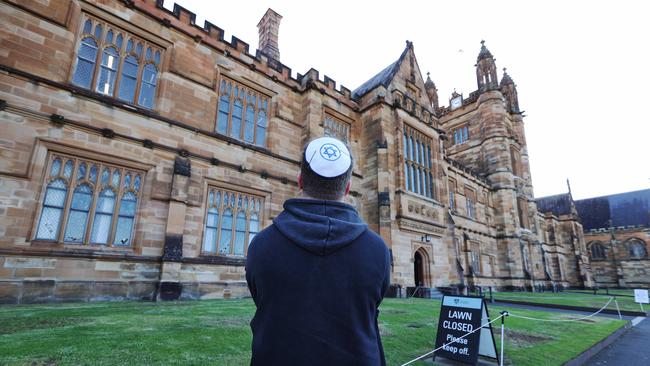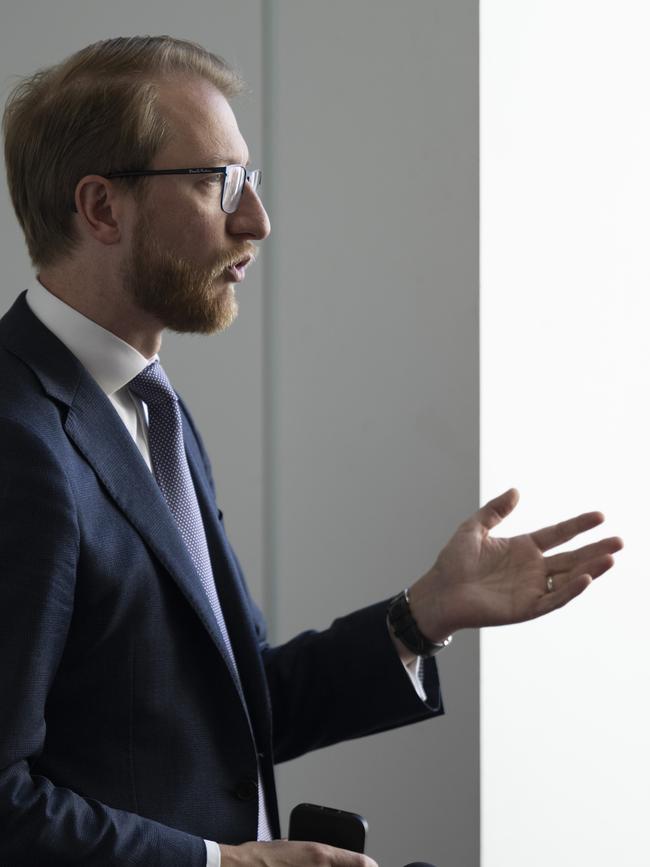Islamic group must be defeated in debate, not legislation

Jewish community leaders here are uniting in seeking a federal ban on Hizb ut-Tahrir. This follows revelations it was involved in November’s violence outside a Melbourne synagogue forcing it to be evacuated, and has been part of the University of Sydney “encampment” and the wider pro-Palestinian unrest that has occurred in the aftermath of the Hamas terrorist attacks of October 7. It also comes after the discovery of a since-deleted press release by the group that praised Hamas’s terrorism and urged neighbouring Muslim countries to “eliminate” Israel.
The statement, and its disappearance, is significant. The British government banned Hizb ut-Tahrir in January citing that it had praised Hamas’s attacks. The ban means the group’s resources are terrorist property and may be seized. Its ability to operate and advocate will be significantly degraded because of the offences attached to membership of, and expressing support for, a listed terrorist organisation.

The UK Home Security Minister said in announcing the ban that Hizb ut-Tahrir actively promotes and encourages terrorism, including praising and celebrating the October 7 attacks and that it had a history of praising and celebrating attacks against Israel and against Jews more widely.
Opposition home affairs spokesman James Paterson has urged the government to “urgently investigate” whether Hizb ut-Tahrir ’s deleted statement and its other comments met the proscription legal threshold, and listing it “without delay” if it did.
At this point, it doesn’t appear our security agencies have advised the government that it should list Hizb ut-Tahrir as a terrorist organisation, although this may have occurred in a classified environment. The threshold for proscribing a group is high. It requires finding that the group is directly or indirectly engaged in preparing, planning, assisting, fostering or advocating a terrorist act. Hizb ut-Tahrir is unlikely to be caught organising a terrorist act.
It can argue that individuals involved in terrorism have deviated from Hizb ut-Tahrir ’s path. The recent revelations, however, suggest that as with the UK, they may have met the threshold of advocating a terrorist act.
Hizb ut-Tahrir is in that grey area between preventing terrorism and preserving liberty. On the publicly available evidence, we should support intensive monitoring of it, but at this stage not a ban. In Australia, it hasn’t been a successful recruiter. Most Muslims dislike Hizb ut-Tahrir and it is excluded from most mosques.
But the threat comes from the ideology that drives the group. It encourages the separation of members from the mainstream, including the Muslim mainstream. It is virulently anti-Western, believing democracy is illegitimate.
The risk is that even without directly organising terrorist attacks, HT’s indoctrination may motivate members to turn fiery words into explosive deeds. Members are taught to feel disgruntled and morally superior. Their involvement in the contentious and combustible environs of the campus protests also increases the risks of their freedom of action. We should challenge Hizb ut-Tahrir, demanding it order members to report anyone trending towards violence. This would provide critical intelligence, pressure it to match public rhetoric with internal action and make any gaps between the two more obvious to security agencies.

A ban might make it harder to track Hizb ut-Tahrir ’s activities. Germany banned it in 2003, but it developed decentralised structures and concealment to avoid criminal consequences. Three new similar extremist organisations formed there. Monitoring illegal groups poses challenges for security agencies. Hizb ut-Tahrir ’s legal status means it has a public platform, but it is easier to observe.
Tolerating Hizb ut-Tahrir is not a risk-free strategy, since there is a possibility some members will adopt violent tactics. But in counter-terrorism, there are no risk-free strategies. Hizb ut-Tahrir will only become a sizeable threat to our way of life if we lose the war of ideas. We should compete with it for the hearts of its potential recruits. Right now, it seems to be on the right side of preaching fire but not yelling fire in a crowded theatre, so it’s best to fight it with continuous debate rather than banning it.
What’s worth considering, however, is the suggestion of the Executive Council of Australian Jewry that the government establish a new national system to designate extremist groups such as Hizb ut-Tahrir, when they haven’t engaged in acts of terrorism. It would be analogous to state laws applicable to criminal gangs, empowering the government to designate an organisation as extremist and so open a range of law enforcement powers. Where the government should be heading now in the counter-terrorism space is following Canada’s decisive recent lead and listing Iran’s Islamic Revolutionary Guard Corps, a powerful armed militia, as a terrorist organisation, and its overseas arm, the Quds Force. The IRGC is the largest sponsor and facilitator of terrorism worldwide.
Anthony Bergin is a senior fellow at Strategic Analysis Australia.







Founded in 1953, Hizb ut-Tahrir is a transnational Islamist activist organisation with a long-term goal of establishing a caliphate ruled under Islamic law. Its headquarters are in Lebanon, but the group operates in at least 32 countries, including Australia.